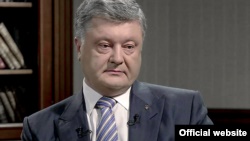Poroshenko: Visa-free EU travel marks Ukraine's 'divorce from Russian empire'
| Publisher | Radio Free Europe/Radio Liberty |
| Publication Date | 12 May 2017 |
| Cite as | Radio Free Europe/Radio Liberty, Poroshenko: Visa-free EU travel marks Ukraine's 'divorce from Russian empire', 12 May 2017, available at: https://www.refworld.org/docid/59818d73a.html [accessed 30 October 2019] |
| Disclaimer | This is not a UNHCR publication. UNHCR is not responsible for, nor does it necessarily endorse, its content. Any views expressed are solely those of the author or publisher and do not necessarily reflect those of UNHCR, the United Nations or its Member States. |
Last Updated: May 12, 2017 11:44 GMT
By RFE/RL
 Ukrainian President Petro Poroshenko speaks to the 1+1 TV channel in Kyiv on May 12.
Ukrainian President Petro Poroshenko speaks to the 1+1 TV channel in Kyiv on May 12.
Ukrainian President Petro Poroshenko says a visa-liberalization deal with the European Union marks his country's "divorce from the Russian Empire."
Poroshenko spoke on May 11, after the deal that will enable Ukrainians to travel to EU Schengen Area countries without a visa cleared a key hurdle in Brussels.
"Today, Ukraine has finalized its divorce from the Russian Empire," he told 1+1 television in an interview, in a remark that was posted on his website on May 12.
"This is precisely how we should view this in philosophical terms," he said. "It is an exit from a more than 300-year history . . . and today Ukraine is returning home."
European Council and European Parliament representatives are expected to rubber-stamp the long-awaited visa-liberation decision on May 17, and the visa-free regime is expected to enter into force on June 11.
Large portions of present-day Ukraine were part of the Russian Empire beginning in the 17th century, and Ukraine was under Moscow's thumb as a Soviet republic for most of the 20th century. It gained independence in the Soviet collapse of 1991.
Relations between Moscow and Kyiv have been severely strained since Russia seized Crimea in March 2014 and fomented unrest in eastern Ukraine, where a war between government forces and Russia-backed separatists has killed more than 9,900 people.
The Ukrainian military said on May 12 that two of its servicemen were killed and six wounded in the previous 24 hours. It said government positions were attacked more than 50 times by the separatists, mostly between 6 p.m. and midnight on May 11.
Also on May 11, U.S. President Donald Trump posted photos of his separate meetings with the top diplomats of Ukraine and Russia on Twitter and urged the two nations to "make peace."
"Yesterday, on the same day – I had meetings with Russian Foreign Minister Sergei Lavrov and the Foreign Minister of Ukraine, Pavlo Klimkin," Trump tweeted under separate photos of himself smiling broadly by each minister in the Oval Office.
"LETS MAKE PEACE!" he wrote.
Trump met with Klimkin after a meeting with Lavrov, who earlier on May 10 met with Secretary of State Rex Tillerson at the State Department.
Russia's interference in Ukraine, where Kyiv and NATO say it has supported the separatists with troops, weapons, and other backing, prompted the European Union and the United States to impose sanctions on Moscow.
The State Department said that in their meeting, Tillerson told Lavrov that "sanctions on Russia will remain in place until Moscow reverses the actions that triggered them."
Link to original story on RFE/RL website
